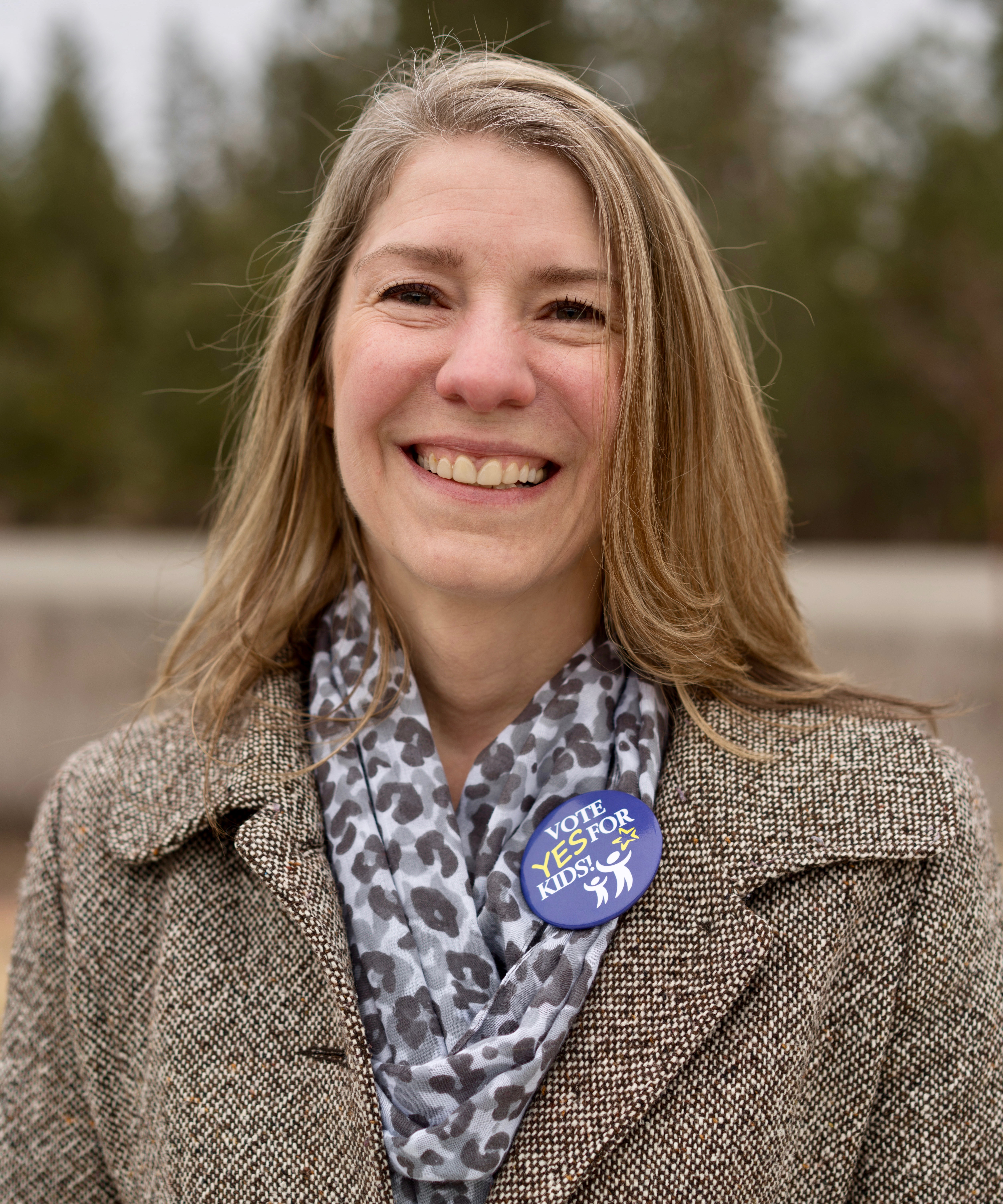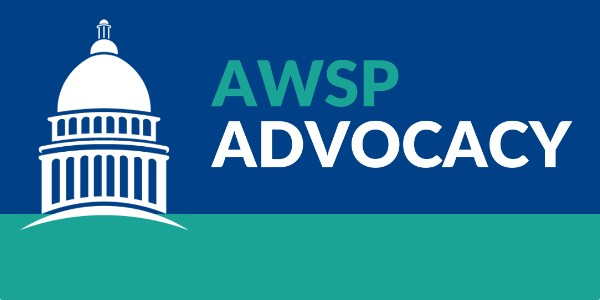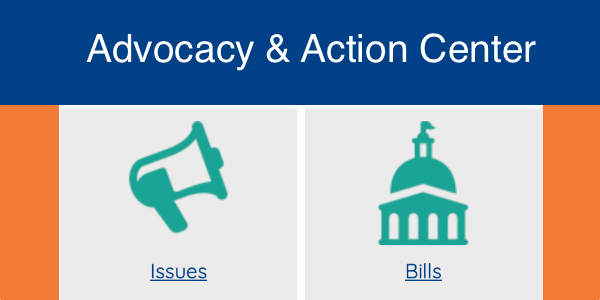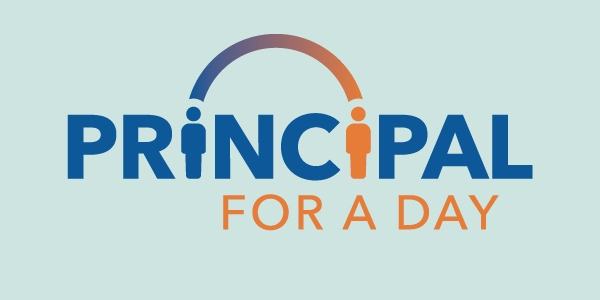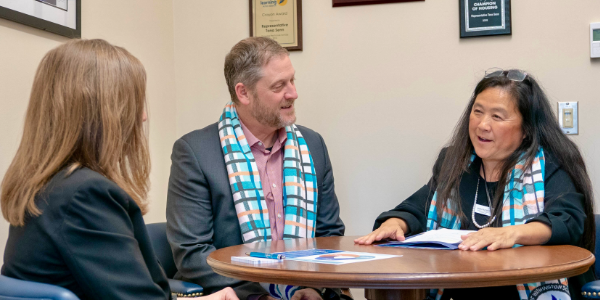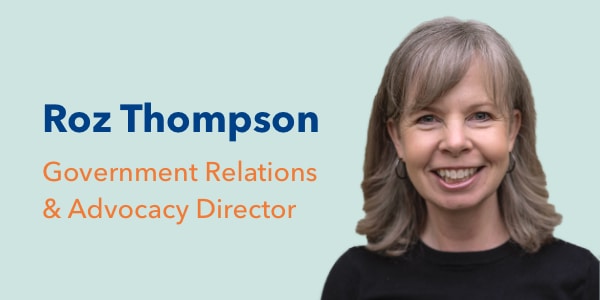We are in the final few weeks of this year’s legislative session, which should end on time on April 23. This week the April 4 cutoff date passed for bills to move out of budget committees. Now the House and Senate are focusing their efforts on meeting the next cutoff date of April 12, when bills (except those necessary to implement the budget) need to pass off the floor of the opposite house. Between now and the end of the session, the action will be both on the floor and behind the scenes as budget negotiations occur.
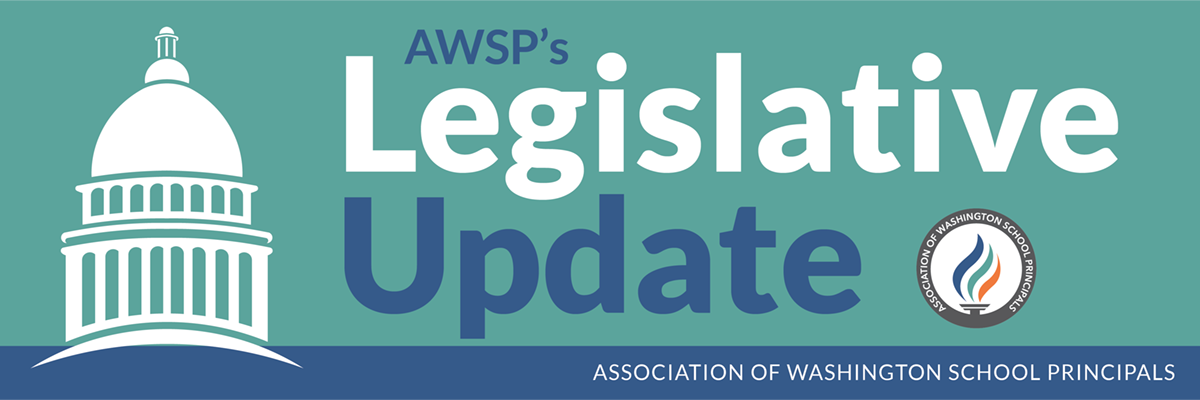
We are in the final few weeks of this year’s legislative session, which should end on time on April 23. This week the April 4 cutoff date passed for bills to move out of budget committees. Now the House and Senate are focusing their efforts on meeting
the next cutoff date of April 12, when bills (except those necessary to implement the budget) need to pass off the floor of the opposite house. Between now and the end of the session, the action will be both on the floor and behind the scenes as budget
negotiations occur.
I watched from the gallery yesterday as SB 5175 easily passed off the House floor by an 84-14 margin. An amendment was added to clarify
that a superintendent might offer a contract for more than one year when a principal has:
- been employed as a principal for three or more consecutive years;
- been recommended by the superintendent as a candidate for a two or three-year contract because the principal has demonstrated the ability to stabilize instructional practices, and received a comprehensive performance rating of level 3 or above in
their most recent comprehensive performance evaluation; and
- met the school district's requirements for satisfying an updated record check.
As we met with legislators about this bill, we offered these ideas about why districts might want to offer a longer contract.
- It is an option that districts can choose to use to recruit and retain leaders, especially for hard-to-fill high school positions.
- We hope districts see this as an opportunity to maintain consistent leadership.
- Dismantling bad-for-student systems and working to make deep, systemic change takes time and consistent, effective leadership.
- Principals deserve greater job security due to the complex nature of their jobs and the years of experience required to become a highly effective and impactful school leader.
In my thank you email to those legislators who supported this bill, I included part of Scott’s testimony where he said, “This bill is about hope. This bill is about protecting, reaffirming, and encouraging our best and brightest
to not only remain in their roles, but to continue being agents of change and hope in their schools.”
We hope this bill provides you with hope because the conversation about your critical role in our education system has been elevated across the state.
Budget Update
Budget writers from the House and Senate are working to compromise on the various funding and policy areas of the operating budget. For a look at how the budgets are similar and different, check out this side-by-side comparison from the League of Education Voters.
Education advocates continue to communicate with legislators about several key funding priorities. Here is an excerpt from a letter that was sent last week to Chair Rolfes and Chair Ormsby from many districts and statewide associations (including AWSP):
Thank you for the investments in public education in both the Senate and House operating budget proposals. As you work to develop a final budget, please consider our comments regarding these priority funding items for schools:
- Special Education: The Senate adjustments to the multiplier and cap for special education funding allows direct investment and support for our students with individual education plans. We respectfully request the Senate language and investment with the addition of inclusionary practice investment dollars.
- Pupil Transportation: The Senate level of funding for pupil transportation is preferable as the House budget does not provide any additional pupil transportation funding. The legislature has passed bills the last two years which would have updated our broken STARS formula and invested in special populations. Please take this first step proposed in the Senate budget.
- Rebase: We request that you follow the House lead for smoothing losses due to the rebase. The rebase smoothing mechanism proposed in the House budget allows districts who are losing regionalization and/or experience factor funding additional time to plan to resize budgets and prepare for reduced funding in these two areas. We also ask for your consideration of lowering the percentage of loss of regionalization and experience factor to not more than 1% per year.
- Levy Equalization: Levy equalization is significantly reduced this year based on new assessed valuation rates. The House recognizes the difficult budget problem this creates for school districts across the state and provides funding for districts who lose a significant amount of funding. Please maintain this House levy equalization offset funding in the final budget.
- Learning Assistance Program: The Learning Assistance Program (LAP) is funded in the Senate budget using federal ESSER funds which then imposes federal funding rules on this state-level reimbursement program. School district administrators have raised serious concerns that the rules for LAP may conflict with those for ESSER. Please do not use ESSER funds to replace state level program funds where federal and state rules may create conflict.
If you can send an email to your legislators about the importance of addressing these funding pieces, this is the week to do so. Thank you!
Bills That Keep Moving
Both of the special education funding bills are still alive. The Senate bill, SB 5311, would raise the special education cap from 13.5%
to 15% and increase the multiplier at a greater rate than the House. The House version, HB 1436, funds special education at a lower
level.
SB 5174 is the transportation funding bill. This bill was narrowed from its original version and would create
the Transportation Safety Net. Safety net awards would be provided to school districts with a demonstrated need for additional transportation funding for special passengers, as mentioned above.
HB 1550 is the Transition to Kindergarten bill. The current version is much improved, and it would rename Transitional Kindergarten
as the Transition to Kindergarten program, and state that this program is not part of the state's program of basic education. It directs OSPI to adopt rules for the administration and the allocation of state funding for this program and specifies
minimum requirements for these rules. And it provides a funding formula for the program using certain portions of the prototypical school funding model and requires certain data to be reported. Current TK programs will remain in place for the 2023-24
school year, but changes would come in the following school year.
HB 1658 would authorize high school students to earn up to two elective credits for paid work experience.
If you are interested in small school construction, SB 5126 (common school trust revenue to the small school modernization
program) is still moving, and the Senate Capital budget gets a good review by OSPI for its attention to small schools. HB 1044 would provide capital financial assistance to small school districts.
SB 5048 is a fantastic bill that passed the Senate. This bill will require institutions of higher education to
provide enrollment and registration in College in the High School courses at no cost to students in grades 9 through 12 at public high schools.
HB 1207 has now passed both the House and the Senate, and it would change the term "emergency expulsion" to "emergency removal" and
permit certain students to request that their records use the new term. It would also require OSPI to develop a model student handbook that includes, among other things, a complaint procedure related to harassment, intimidation, bullying, and discrimination.
HB 1308 says that school districts may offer students the opportunity to meet graduation pathway requirements by completing a performance-based
learning experience through which the student applies knowledge and skills in a real-world context, providing evidence of applying state learning standards to ELA and math standards (this was amended from the original version that allowed students
to choose two of the core areas).
SB 5243 passed the Senate, and it would revise high school and beyond plan (HSBP) requirements and require OSPI to facilitate the transition
to and adoption of a common online platform for HSBPs. It would require school districts to provide access to an adopted universal platform within two years of platform development.
The recess bill, SB 5257 has now passed both the House and the Senate and requires 30 minutes of recess and encourages recess before
lunch. It also includes language that discourages withholding recess for disciplinary or academic reasons.
HB 1316 is another dual credit bill that would allow Running Start students to be funded up to a combined maximum
enrollment of 1.6 FTE. It would also allow high school graduates with 15 or fewer college credits to earn before meeting associate degree requirements to continue participation in the summer academic term following graduation. I believe that Senator
Hawkins intends to add a floor amendment to this to add 10th grade Running Start (one online class only per quarter) but I’ve been working with the WEA and the Washington School Counselor Association to oppose this idea.
There are a few more education bills out there that will pass and I’ll have my “Top 10” list of important bills from this session ready to share in a few weeks. There are also some bills that didn’t make it this year that will
most likely return next session. Here is my latest bill tracking list.
Get Involved
Our advocacy efforts need all of our voices to contribute to the process. There are many different ways (big and small) that you can get involved in these efforts. One is by reading these weekly updates! Shout out to Michelle Zimnisky, Principal at Northwood
Elementary in Puyallup, who told me last week that she’s a regular reader. Thanks, Michelle!
If you have questions or comments or want to get involved, please reach out to me.



